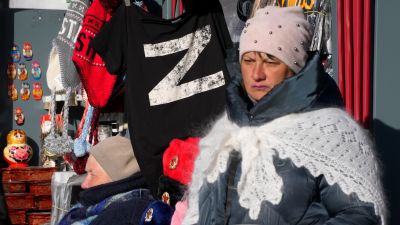Ukraine calls on countries to ban pro-Russian 'Z' symbol after Germany seeks to criminalise it

Publicly displaying the symbol 'Z' to show support for Russia's war in Ukraine could be made illegal in parts of Germany, with those who brandish it liable for prosecution.
The letter Z has become a powerful pro-Putin symbol since Russia invaded Ukraine, both inside and outside of Russia. Russian forces have been displaying it on military vehicles while supporters of the war have also begun brandishing it on car windows and clothing as a sign of their solidarity with the Kremlin's war.
The state of Berlin has become the latest region in Germany to seek to punish those who use the Z symbol to endorse Russia's aggression, following announcements by Bavaria and Lower Saxony that they would be making it a criminal act.
Ukrainian Minister of Foreign Affairs Dmytro Kuleba called on other countries to follow Germany's lead.
In a tweet he wrote: "I call on all states to criminalize the use of the 'Z' symbol as a way to publicly support Russia's war of aggression against Ukraine. ’Z’ means Russian war crimes, bombed out cities, thousands of murdered Ukrainians. Public support of this barbarism must be forbidden."
Lithuanian politicians are debating a ban on using the ‘Z’ symbol when used as a show of support for Russia’s attack on Ukraine.
A vote in Lithuania’s parliament is expected this week. If it passes, people who violate a ban could face a fine of up to 500 euros ($550). Soviet and Nazi symbols are already banned there.
A spokesman for the German Interior Ministry said on Monday that security services are aware the symbol is also being used at rallies in Germany. He said the letter can, under certain circumstances, be considered a sign of support for Russia’s invasion of Ukraine and could make people “criminally liable.”
"The letter Z as such is of course not forbidden, but its use may in individual cases constitute an endorsement of the Russian war of aggression," the spokesperson said. "The Russian war of aggression on the Ukraine is a criminal act, and whoever publicly approves of this war of aggression can also make himself liable to prosecution," he continued.
People in Germany face up to three years in jail for displaying Nazi symbols, such as the swastikas, in most circumstances.
In Germany, the law considers these the "symbols of anti-constitutional organisations." The Nazi salute and statements such as "Heil Hitler" are also banned in public.
There are several interpretations of the Z symbol that has becoming a powerful identity and propaganda tool in Russia's war with Ukraine. Some believe it could mean “Za pobedy" (victory), others - as "Zapad" (West). Others say that it stands for Zelenskky, the Ukrainian president, who has survived several assassination attempts.
Senior International Correspondent John Irvine filmed dozens of Russian vehicles sporting the Z symbol as they left Mariupol
Russian forces have used the letter Z as an identifying symbol on their vehicles in Ukraine but it was also spotted on Russian tanks in the Syrian civil war.
What ever its original meaning, Z becoming a patriotic symbol for many Russians - and others outside its border - who want to show their support for the war and Vladimir Putin.
Russian artistic gymnast Ivan Kuliak displayed a Z on the front of his leotard as he stood on the podium next to a Ukrainian athlete who had won the gold and faced an investigation by the International Gymnastics Federation who denounced his "shocking behaviour".
The symbol has appeared on T-shirts, graffiti and advertising boards, and displayed on giant screens above Russian cities and on pro-Putin placards.
What You Need to Know - Listen now